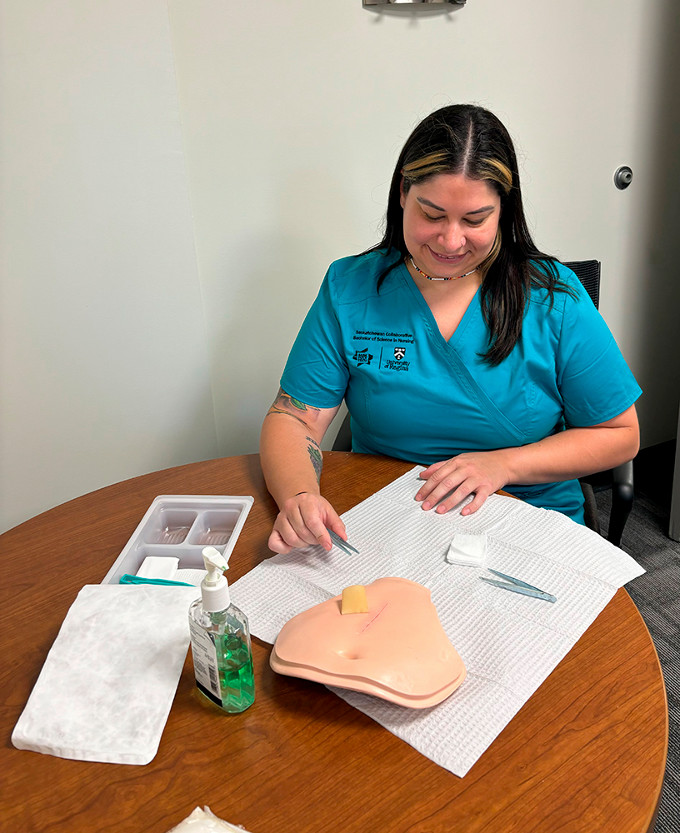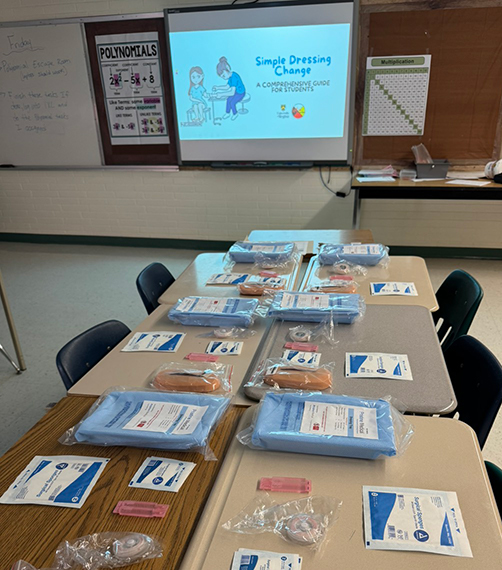Building Pathways
Indigenous Mentorship Program Inspires High School Student to Pursue Nursing
A warm smile, a welcoming presence, and the chance to connect with someone who understands your journey — that’s what the Indigenous Mentorship Program offers high school students in Fort Qu’Appelle. Launched in 2024 as a pilot initiative by the University of Regina’s Faculty of Nursing, the program is already making a meaningful difference.
“The idea came out of a conversation between myself and our former dean,” said Selena Talbot, RN, MAEd, and program lead. “I’ve always been passionate about Indigenous student success. We wanted to create something that supports students well before they reach post-secondary.”
The program was developed in partnership with Bert Fox Community School, where students from surrounding First Nations communities attend. A total of 23 students in Grades 9–12 participated in monthly sessions designed to spark interest in nursing, promote confidence, and create culturally-safe learning spaces.
From learning how to take blood pressure to practicing dressing changes, students engaged in hands-on activities that offered a glimpse into the realities of nursing practice. One of the highlights was an inspirational presentation by an Indigenous nurse, where students asked questions and heard firsthand how culture and career can go hand-in-hand.
“We don’t have enough Indigenous nurses in Saskatchewan,” Talbot explained. “Students need to see themselves in these roles.”
 Mentorship wasn’t limited to clinical skills. The program also offered both formal and informal academic advising. “Every interaction was a chance for questions,” said Talbot. “The students were eager to learn about classes, scholarships, and what nursing school is really like.”
Mentorship wasn’t limited to clinical skills. The program also offered both formal and informal academic advising. “Every interaction was a chance for questions,” said Talbot. “The students were eager to learn about classes, scholarships, and what nursing school is really like.”
Equally important were the relationships built along the way. One student who was extremely shy during the first session grew noticeably more confident by the third visit. “She was joking around with me by the end,” Talbot said. “That shift in confidence is what this program is all about.”
Feedback from students and staff was overwhelmingly positive. Students especially appreciated the interactive format and cultural relevance of the sessions. The year wrapped up with a community-building activity: tie-dying shirts, a creative and fun way to celebrate the students’ journey.
Plans for 2025–26 include more frequent visits, expanded skill-building opportunities such as CPR and first aid, and deeper integration of Indigenous ways including traditional medicine and wellness practices. Talbot also hopes to involve Elders and Knowledge Keepers more directly.
“Our long-term goal is to expand to more schools and communities across Saskatchewan,” she said. “I want this to be a permanent part of the educational experience for Indigenous youth.”
The program is more than a pathway to nursing. It’s a step toward reconciliation, equity, and representation in healthcare.
“When students feel seen, supported, and connected, they thrive,” Talbot said. “This mentorship program proves that.”
Our youth have limitless potential. They just need someone to believe in them, to guide them, and to say you belong here.
Watch the video from Tiffany Newby, practicing LPN, a current SCBScN student & student nurse researcher. She shares her experience assisting instructor Selena Talbot with the mentorship pilot project.
Video courtesy of Tiffany Newby
